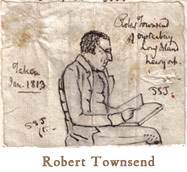Robert Townsend (spy)
| Robert Townsend | |
|---|---|

Only surviving portrait of Robert Townsend
|
|
| Codename(s) | Samuel Culper, Jr. |
| 723 | |
|
|
|
| Born |
November 25, 1753 Oyster Bay, New York |
| Died | March 7, 1838 (aged 84) |
| Nationality | American |
| Religion | Quaker |
| Children | Robert Townsend, Jr. |
Robert Townsend (November 25, 1753 – March 7, 1838) was a member of the Culper Ring during the American Revolution. Townsend operated in New York City with the aliases “Samuel Culper, Jr.” and “723,” and gathered information as a service to General George Washington. He is one of the least known operatives in the spy ring, once demanding that Abraham Woodhull (aka “Samuel Culper”) never tell his name to anyone, not even Washington.
Townsend was the third son of eight children of Samuel and Sarah Townsend from Oyster Bay, New York. Samuel was a Whig-slanted politician who owned a store in Oyster Bay. Little is known about Robert’s early life. His mother was an Episcopalian and his father was a liberal Quaker. He held patriotic feelings towards his country but was a Loyalist. Robert matured in an atmosphere in which his father routinely acted in ways that were considered dangerous by traditional Quakers.
Despite his father’s political battles, young Robert showed little interest in public service. Samuel arranged for Robert to apprentice during his mid-teens with the House of Templeton & Stewart, a merchant firm. During this time, Robert lived and worked among soldiers and residents of Holy Ground, New York City’s biggest red light district. Templeton & Stewart catered to the working-class residents of this district. Ultimately, Townsend’s early years were dedicated to making a fortune and not demonstrating his underlying patriotism, which would have undermined his financial goals.
Townsend fared well during the war in financial terms, operating a store even as he was spying for Washington. Between May 1781 and July 1783, he brought in £16,786, while his expenditures amounted to £15,161, for a profit of £1,625 over that span of time.
A number of factors led Townsend to the Culper Spy Ring, including the influence of Thomas Paine’s Common Sense, British harassment of his family, and his relationship with Woodhull.
...
Wikipedia
